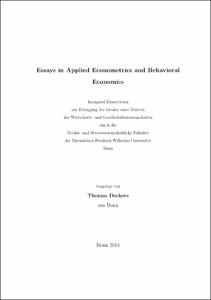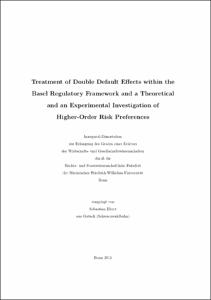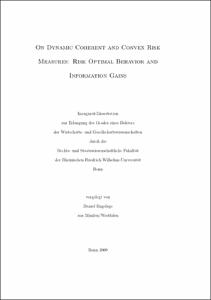Evaluating intergenerational persistence of economic preferencesA large scale experiment with families in Bangladesh

Evaluating intergenerational persistence of economic preferences
A large scale experiment with families in Bangladesh

| dc.contributor.author | Chowdhury, Shyamal | |
| dc.contributor.author | Sutter, Matthias | |
| dc.contributor.author | Zimmermann, Klaus F. | |
| dc.date.accessioned | 2024-09-12T07:27:06Z | |
| dc.date.available | 2024-09-12T07:27:06Z | |
| dc.date.issued | 03.2018 | |
| dc.identifier.uri | https://hdl.handle.net/20.500.11811/12104 | |
| dc.description.abstract | Economic preferences – like time, risk and social preferences – have been shown to be very influential for real-life outcomes, such as educational achievements, labor market outcomes, or health status. We contribute to the recent literature that has examined how and when economic preferences are formed, putting particular emphasis on the role of intergenerational transmission of economic preferences within families. Our paper is the first to run incentivized experiments with fathers and mothers and their children by drawing on a unique dataset of 1,999 members of Bangladeshi families, including 911 children, aged 6-17 years, and 544 pairs of mothers and fathers. We find a large degree of intergenerational persistence as the economic preferences of mothers and fathers are significantly positively related to their children’s economic preferences. Importantly, we find that socio-economic status of a family has no explanatory power as soon as we control for parents’ economic preferences. A series of robustness checks deals with the role of older siblings, the similarity of parental preferences, and the average preferences within a child’s village. | en |
| dc.format.extent | 94 | |
| dc.language.iso | eng | |
| dc.relation.ispartofseries | ZEF-Discussion Papers on Development Policy ; 250 | |
| dc.rights | In Copyright | |
| dc.rights.uri | http://rightsstatements.org/vocab/InC/1.0/ | |
| dc.subject | Intergenerational transmission of preferences | |
| dc.subject | time preferences | |
| dc.subject | risk preferences | |
| dc.subject | social preferences | |
| dc.subject | children | |
| dc.subject | parents | |
| dc.subject | Bangladesh | |
| dc.subject | socio-economic status | |
| dc.subject | experiment | |
| dc.subject.ddc | 300 Sozialwissenschaften, Soziologie, Anthropologie | |
| dc.subject.ddc | 320 Politik | |
| dc.subject.ddc | 330 Wirtschaft | |
| dc.title | Evaluating intergenerational persistence of economic preferences | |
| dc.title.alternative | A large scale experiment with families in Bangladesh | |
| dc.type | Arbeitspapier | |
| dc.publisher.name | Center for Development Research (ZEF), University of Bonn | |
| dc.publisher.location | Bonn | |
| dc.rights.accessRights | openAccess | |
| dc.relation.eissn | 1436-9931 | |
| dc.relation.url | https://www.zef.de/fileadmin/user_upload/DP_ZEF_250.pdf | |
| ulbbn.pubtype | Zweitveröffentlichung | |
| dc.version | publishedVersion |







